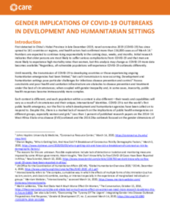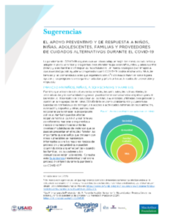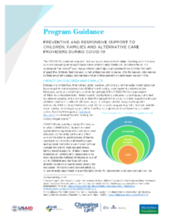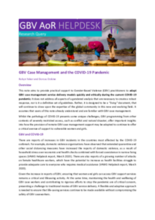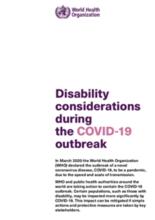Displaying 1721 - 1730 of 4424
This webpage from Save the Children features answers to frequently asked questions about the coronavirus, as well as advice for talking to your children about the situation.
This analysis from CARE highlights the impacts of the COVID-19 crisis on women and girls, including the increased risk of violence and/or separation from caregivers for children, particularly girls.
This page on the website for the Inter-Agency Standing Committee Gender-based Violence (GBV) Guidelines contains COVID-19-specific resources and pulls from the knowledge-base of ebola, zika and cholera outbreaks.
Este recurso de Changing the Way We Care ofrece una guía en la adaptación y/o el desarrollo de servicios y programas para continuar atendiendo de mejor forma a los NNA y las familias durante este periodo de tiempo de cambio constante, particularmente en el monitoreo virtual de niños, niñas, adolescentes, sus familias y para el personal de hogares de protección durante la pandemia de COVID-19.
Este documento de Changing the Way We Care utiliza un marco ecológico para mostrar como la pandemia del COVID-19 crisis podría afectar a los NNA, las familias y las comunidades y como ayudar a los programas a reorganizar, adaptar y priorizar las actividades de prevención y respuesta.
This brief from Changing the Way We Care uses an ecological framework to help illustrate how the COVID-19 crisis might impact the children, families and communities and how to help programs adapt, reorganize and prioritize prevention and response activities.
This note from the GBV AoR Helpdesk aims to provide practical support to Gender-Based Violence (GBV) practitioners to adapt GBV case management service delivery models quickly and ethically during the current COVID-19 pandemic.
This briefing from the World Health Organization (WHO) outlines actions for meeting the needs of people with disabilities during the COVID-19 pandemic.
This page from the UNICEF website features the latest updates, explainers for parents and teachers, and resources for media related to COVID-19.
On this webpage, ISPCAN has gathered resources on how to navigate through the COVID 19 pandemic.

